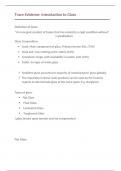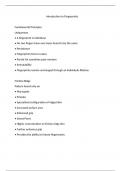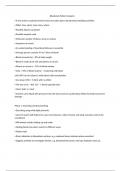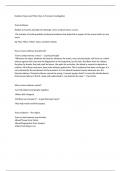Forensics Science (CHEM1025)
University of Greenwich
All 4 results
Sort by

-
Trace Evidence: Intro to Glass
- Lecture notes • 7 pages • 2023
-
rudhainafirdous
-
- £5.89
- 1x sold
- + learn more
At a crime scene, glass that has been broken or fragmented is critical forensic evidence. Glass pieces from headlights may leave evidence about the unknown car at a hit-and-run crime scene. Investigators can also use window fragments or glass fractures to assess the direction, angle, and first contact of a gunshot.

-
Intro to Fingerprints
- Lecture notes • 13 pages • 2023
-
rudhainafirdous
-
- £5.89
- + learn more
Fingerprints are the most dynamic type of evidence... They are one-of-a-kind, permanent, objective, and precise... The outcomes are definitive and final. Fingerprints can be identified to the exclusion of all others, something other sorts of forensic testing cannot do. Even DNA is not as precise, with identical twins sharing the same DNA.

-
BPA and its functions in Forensics
- Lecture notes • 11 pages • 2023
-
rudhainafirdous
-
- £6.09
- + learn more
Blood pattern analysis is a helpful tool in forensic science that can aid in crime scene reconstruction. When combined with DNA analysis and other investigation findings, blood evidence can provide more conclusive and detailed details of the sequence of events.

-
Evidence types and their uses in Forensics
- Lecture notes • 7 pages • 2023
-
rudhainafirdous
-
- £6.09
- + learn more
Evidence is defined as everything that can be utilised to determine whether or not a crime was committed. Evidence can be used to connect a suspect to a crime scene, confirm or contradict an alibi or statement, identify a perpetrator or victim, exonerate the innocent, induce a confession, or lead additional investigation. Not all evidence is created equal. In fact, evidence is classified into a variety of categories based on its features and dependability. An eyewitness narrative, for example...

How did he do that? By selling his revision notes on Stuvia. Try it yourself! Discover all about earning on Stuvia


